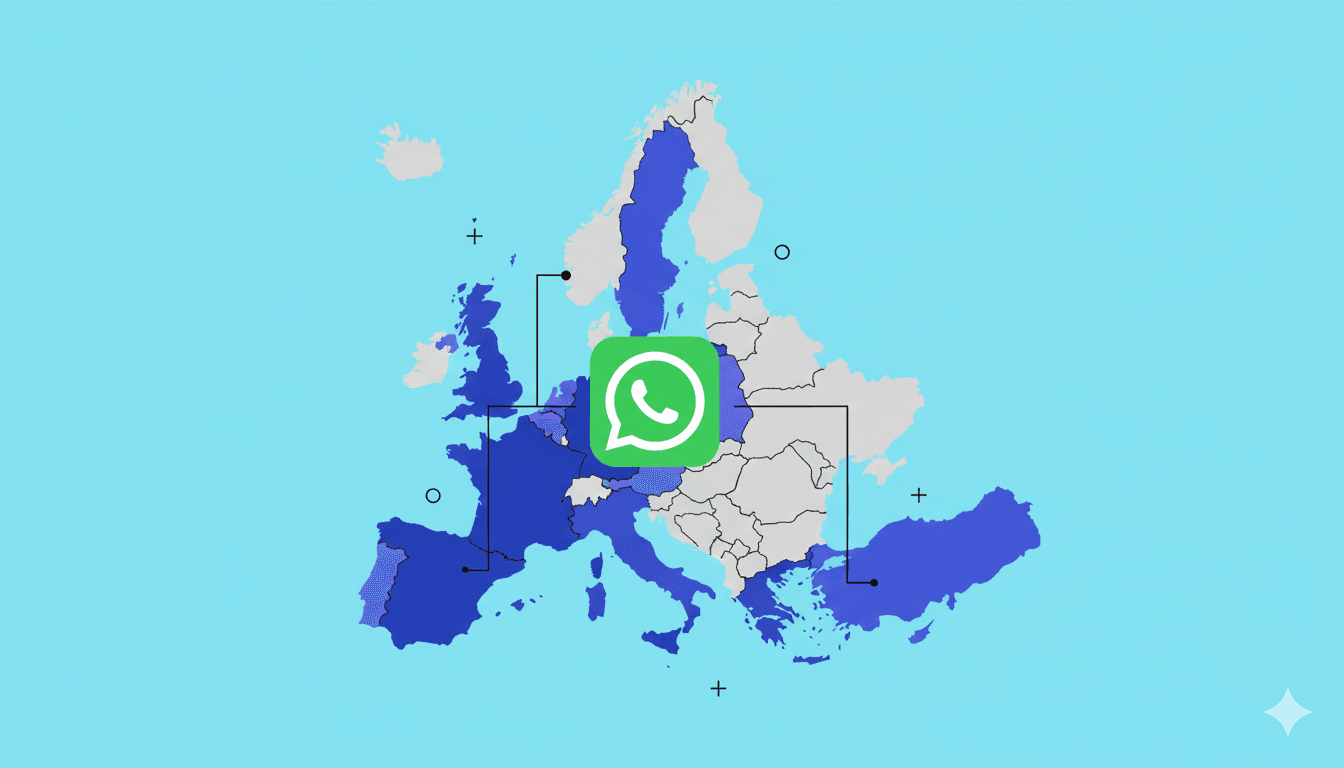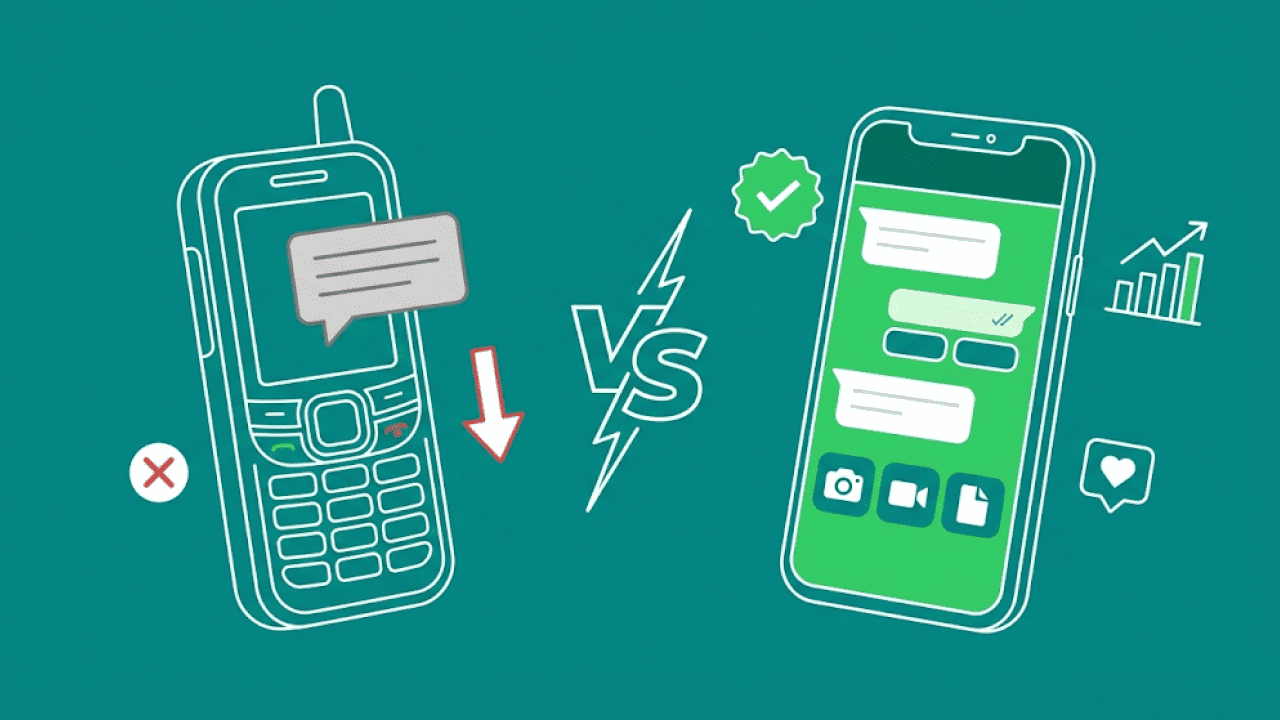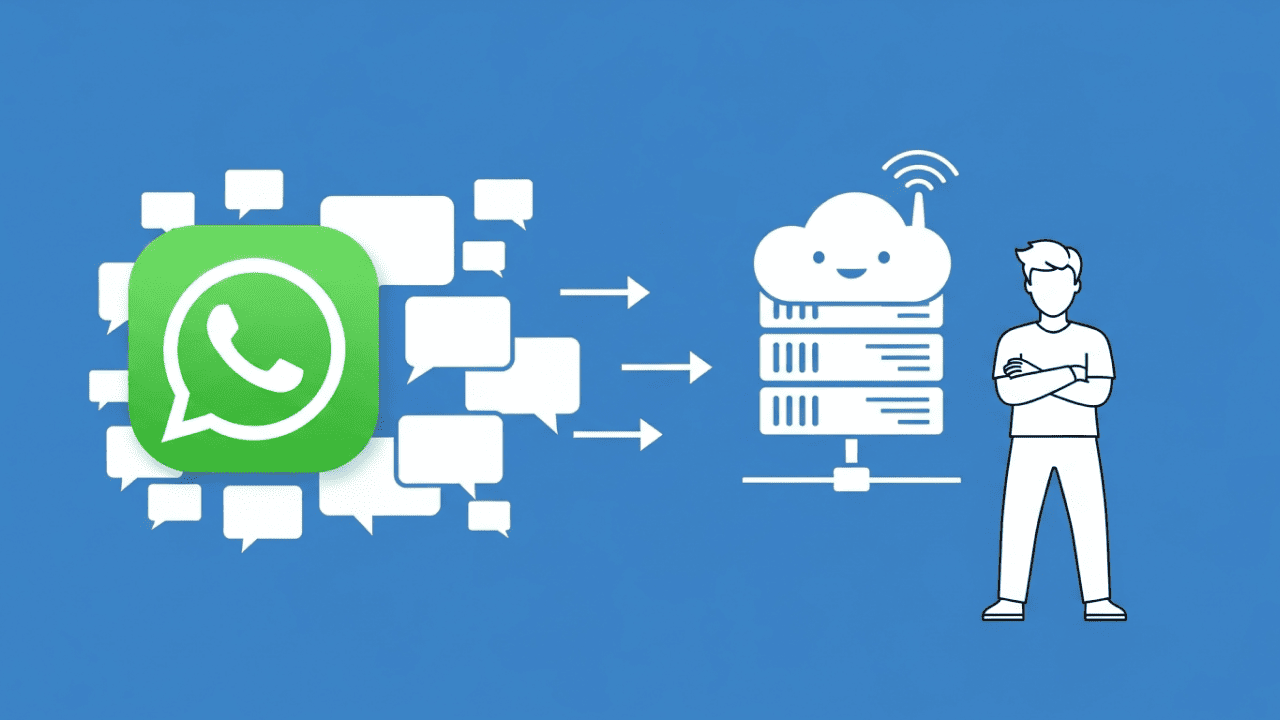Three Versions of WhatsApp – Only One Is GDPR Compliant
Before we talk about data protection, let's get one thing straight: There's no single "WhatsApp". There are three completely different products with very different data protection realities.
WhatsApp Private App
The Private App is for personal use. Full stop. If your sales team uses it for customer conversations, you're violating the GDPR. No opt-in, no right of access, no deletion capability. This isn't a grey area – it's a clear no-go.
WhatsApp Business App
The free WhatsApp Business App sounds tempting. Free, quick to set up, and off you go. The problem: The app automatically syncs your entire contact list with Meta's servers. Including contacts who don't even have WhatsApp and never gave you consent.
On top of that, Meta processes metadata, usage profiles and device information for advertising purposes. You're essentially handing over your customers' data to Meta – without their knowledge. That alone is a GDPR violation.
WhatsApp Business API – The Only Safe Option
The WhatsApp Business API is the only way to use WhatsApp in a business context while staying GDPR compliant. With the API, you don't grant access to any employee's phone contact list. Communication runs through a controlled infrastructure.
With a provider like Chatarmin, customer data is hosted on EU servers. You have full control over consent, opt-outs and data deletion. And you get a Data Processing Agreement (DPA) that properly governs your obligations.
GDPR Differences at a Glance
| WhatsApp Private | Business App | Business API |
|---|
| Purpose | Personal | Small businesses | Professional business communication |
| Contact sync with Meta | ✅ Yes | ✅ Yes | ❌ No |
| Double opt-in (DOI) | ❌ | ❌ | ✅ |
| EU server hosting | ❌ | ❌ | ✅ |
| DPA with provider | ❌ | ❌ | ✅ |
| Consent Art. 6 GDPR | ❌ | ❌ | ✅ |
| Right of access Art. 15 | ❌ | ❌ | ✅ |
| Right to erasure Art. 17 | ❌ | ❌ | ✅ |
| Right to object Art. 21 | ❌ | ❌ | ✅ |
| Data portability Art. 20 | ❌ | ❌ | ✅ |
Quick Primer: What the GDPR Requires from You
Before we go deeper, here are the GDPR fundamentals that matter for WhatsApp. The General Data Protection Regulation has applied since 2018 to any business processing personal data of EU citizens – whether you're based in Vienna, Zurich or New York. The core principles you need to follow on WhatsApp:
Lawfulness and consent: You need a valid legal basis before messaging anyone on WhatsApp. In most cases, that's explicit consent (Art. 6(1)(a) GDPR). "The customer gave me their number" doesn't cut it.
Purpose limitation: You may only use customer data for the purpose covered by their consent. A newsletter opt-in doesn't automatically mean you can use that number for retargeting.
Data minimisation: Only collect the data you actually need. Phone number and name for WhatsApp communication? Yes. Syncing the entire contact list to Meta's servers? No. This is exactly where the Business App fails.
Data subject rights: Your customers have the right to access (Art. 15), rectification (Art. 16), erasure (Art. 17) and data portability (Art. 20). You must be able to fulfil these rights at any time. The Business App makes this technically impossible. The API doesn't.
Accountability: You need to demonstrate that you comply with the GDPR. Documented consent, traceable processes, a DPA with your service provider. Without the API and a professional provider, that's wishful thinking.
Why the "Free" Business App Could Ruin You in 2026
The WhatsApp Business App is built for the bakery around the corner. Not for a company that processes customer data at scale. Two problems show why.
Every time your employee opens the Business App, it transmits metadata to Meta: Who messages whom, when, how often, from which device. Meta uses this data for ad profiles – and cross-references it with Facebook and Instagram data.
The Munich Higher Regional Court (OLG Munich) made it clear in late 2025: When companies link data without a sufficient legal basis, affected individuals are entitled to damages. Courts are now awarding non-material damages of €250 to €750 per affected contact. Do the maths on your customer base.
Meta introduced a "less personalised advertising" model in January 2026 – but that's merely a stopgap after the previous "pay-or-consent" model (either pay or accept tracking) effectively failed in the EU. The European Commission deemed it insufficient. Meta is under constant regulatory scrutiny. The takeaway for you: Don't rely on Meta's terms of service. Secure your own data sovereignty. With the API, you stay in control – with the app, you hand control to Meta.
Through the API, this risk disappears. You communicate directly via the API infrastructure. No metadata feeding into Meta's ad profiles. No mixing of business and personal contacts.
The BYOD Problem (Bring Your Own Device)
Your sales rep uses their personal phone with the Business App installed. That means: Customer data sits on a private device, mixed in with personal contacts and WhatsApp groups. In a data protection audit, that's a disaster.
With a professional API solution for WhatsApp marketing, your team works through a central inbox. No personal phones, no data mix, no risk. D2C brands like bedrop switched their setup in a matter of days – clean, documented, audit-proof.
What Changed in 2026: DSA, DMA and New AI Rules
In 2026, the EU tightened several regulations that directly affect how businesses use WhatsApp. These are the three changes you need to know.
In January 2026, the European Commission classified WhatsApp's Channels feature as a Very Large Online Platform (VLOP) – more than 45 million users in the EU make this mandatory. The result: Channels are now subject to stricter transparency and compliance obligations under the Digital Services Act (DSA). Meta has until mid-May 2026 to fully implement the risk management requirements. For compliance teams, the clock is ticking.
Private chats and the Business API are not affected. But if you use Channels for business marketing, new rules on content moderation and risk assessment apply. Most GDPR articles still treat Channels as a harmless feature. That's no longer accurate as of January 2026.
Interoperability: WhatsApp Opens Up to Third-Party Messengers
Under the Digital Markets Act (DMA), WhatsApp is now interoperable. Customers can potentially message you through third-party messengers like BirdyChat or Haiket. End-to-end encryption is fundamentally preserved – the Signal Protocol is mandatory. However: The E2EE handoff to third-party apps is technically complex. If the third-party provider implements it sloppily, a security risk arises. Users must actively opt in before messages flow through third-party apps – that's the safety net.
No reason to panic, but every reason to be technically prepared. The WhatsApp Cloud API is the current technical foundation for these scenarios and the standard for businesses that want to stay on the safe side in 2026.
Almost everyone underestimates this point: As of 15 January 2026, Meta banned the use of generic AI bots on the WhatsApp Business API. Running a free-chatting ChatGPT clone on the API – that's no longer allowed.
Only task-specific automations are permitted: WhatsApp chatbots that serve a clearly defined business purpose. Checking order status, answering support queries, booking appointments. If you've been running "wild" AI experiments on the API, you need to clean that up now – or risk losing your API access.
At Chatarmin, we build WhatsApp automations that comply with Meta's policies from day one. No risk, no retrofitting.
Special Case: Healthcare and Education
For certain industries, the situation is even more severe. Doctors, pharmacists and healthcare workers are bound by professional secrecy obligations (§ 203 StGB in Germany, with equivalent regulations across the EU). Using the standard WhatsApp app for patient communication isn't just a GDPR headache – it's a potential criminal offence. The app creates metadata profiles and syncs contact data. Both are incompatible with medical confidentiality.
The same applies to schools and educational institutions: Germany's Data Protection Conference (DSK) recommends against using the WhatsApp app in schools. Teachers who contact parents through their personal app are also transferring third-party contact data to Meta.
In both cases, the API is the way out: No contact list sync, no metadata profiles, full control over data processing.






![Shopify WhatsApp: Chatarmin’s Shopify WhatsApp Integration [UPDATE 2026!]](https://blogfiles-chatarmin.s3.eu-central-1.amazonaws.com/Whats_App_fuer_D2_C_Brands_Best_Practice_Cases_0a3e7f6754.jpg)

